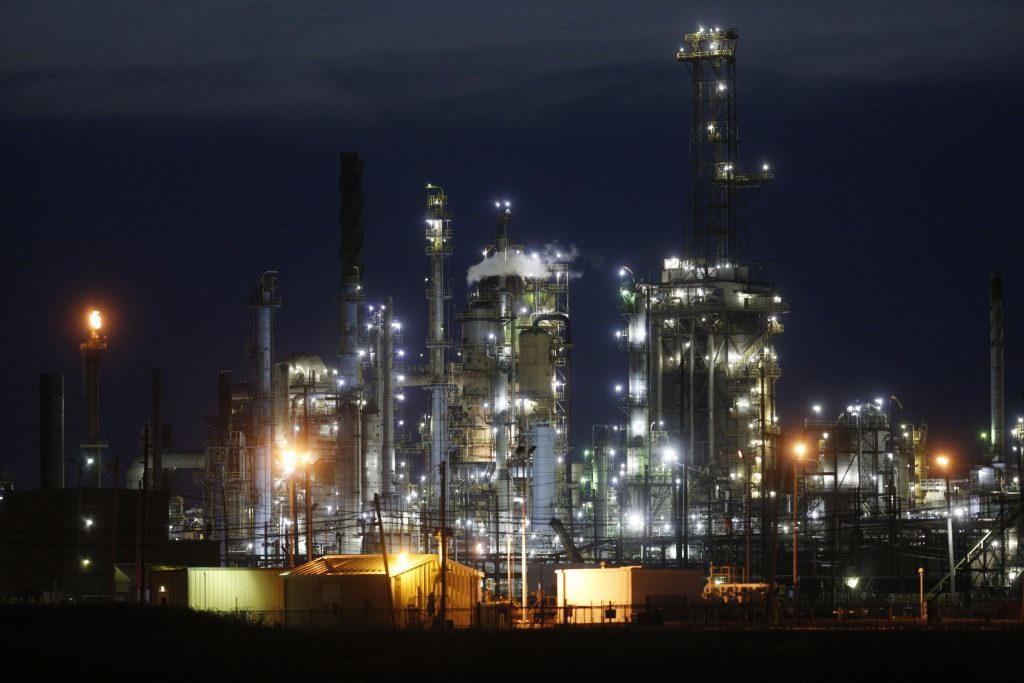
OPEC and Russia said they were about halfway toward clearing a global oil glut and urged fellow producers to stay focused and finish the job, without making any immediate changes to their agreement.
The market has markedly improved since the last time ministers from the Organization of Petroleum Exporting Countries and their allies met, said Kuwait’s Oil Minister Issam Almarzooq. Bloated stockpiles of fuel have been “massively drained” and the producers have implemented more than 100 percent of their agreed cuts, according to OPEC Secretary-General Mohammad Barkindo.
“We are on the right track and there is now more light at the end of the tunnel,” Almarzooq said at the opening session of ministerial talks in Vienna on Friday. There’s been a “huge drop” in inventories of 170 million barrels this year, but they need to be reduced further and “this is not the time to take our foot off the accelerator.”
The meeting of OPEC and its allies in Vienna on Friday concluded without any recommendation to extend output cuts, said one delegate, who asked not to be named because the talks were private. While their accord has shown signs of success in recent months, the market could return to surplus next year if the group allows the deal to expire at the end of March.
The producers, who together pump more than half the world’s oil, have several reasons to hold a steady course. Brent crude, the international benchmark, closed at $56.43 a barrel on Thursday, the highest level since February and an increase of more than 25 percent since June. Nine months into their agreement, implementation of the pledged 1.8 million barrels a day of production cuts remains high. Still, the group has yet to find an answer to the problem of rising U.S. shale output, which has undermined their efforts.
Wait and See
Ministers gathering in the Austrian capital at times made conflicting statements, but broadly signaled that there was no need for concrete steps to address perceived shortcomings in their agreement — notably that the cuts may end too early, or they could be undermined by production increases from Libya or Nigeria.
“We need not only to keep the pace and go on with our coordinated efforts in full, but also need to work out a strategy for the future,” Russian Energy Minister Alexander Novak said before the meeting. It was too early to talk about extending the cuts, he said.
As U.S. shale oil continues to thrive and seasonal demand wanes, the surplus that has weighed on markets for three years could return. If OPEC doesn’t extend the supply curbs, the market will return to oversupply again, forecasts from the International Energy Agency indicate.
“OPEC members are trying to target a figure of close to $60 a barrel. We’re not too far away from that,” Nigerian Minister of State for Petroleum Emmanuel Ibe Kachikwu said in an interview with Bloomberg television in Vienna before the meeting. “If we get to March and find that there’s a need to do more, I think we will.”
It’s in OPEC’s interest to wait before pledging to extend its cuts, Goldman Sachs Group Inc. said in a note dated Sept. 21. “The main focus of the meeting will be the monitoring of compliance to the cuts, which has reached new highs of 110 percent in August, as well as Libya and Nigeria’s production levels,” the bank said.
Nigerian Cap
The two African nations are currently exempt from cutting output because of internal strife, and recent production gains from both countries have diluted the efforts of other members to boost prices.
Caps for both Libya and Nigeria were discussed, but not finalized at Friday’s meeting. It would be good for those countries to participate in the effort to balance the market once they can achieve and maintain a specific production level, Russia’s Novak told reporters.
Nigeria’s Kachikwu reiterated before the meeting that his country would accept an output cap once security in its oil-producing region has fully stabilized.
“Militancy is down, there’s a bit more calm in the Niger Delta areas — our production has gone from the all time low of about 1.1 million barrels a day up to about 1.7 million to 1.75 million,” Kachikwu said. When the country achieves consistent production of 1.8 million barrels a day “we will basically place a cap on ourselves,” he said.
Libya is still facing a lot of problems and the situation is very unstable, Venezuelan Oil Minister Eulogio del Pino told reporters after the meeting.
Recommended for you
